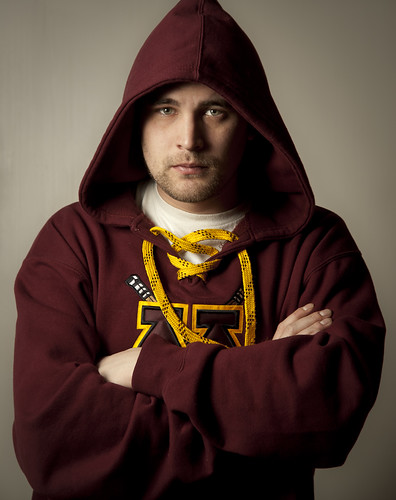Thanks Kodak ... thanks a lot.
Nikon D200, 70mm, 1/250 @ f/4.5, ISO 100, SB800 reflecting in closed down umbrella camera left 1/8 power, CLS
There's debate around the photog interwebs about "post-processing." Some call it "post." Others refer to it as "re-touching." The debate arises from the premise that the better photographer is the one that gets everything perfect "in camera" (I think that includes zit removal and model releases) and the more someone post-processes their images the lamer-their-photographic-ass. Many are quite fervent in their argument against post-processing. Those people spend too much time wading in trivia when they should be wacking ... well ... their problem is probably a lack of coordination.
Let me just thank Kodak for why we think this way. "You press the button we do the rest." That's what they said. And for years, they successfully suppressed the existence of post-processing to the point that it's been reduced to inexplicable magic ... something the common man would never know!
Now we have digital everything. Someone who says, "I don't post-process ... they come out of the camera that way" marks a really naive amateur or a really lazy professional. Or possibly a really lazy amateur or a really naive professional ... one or the other. Either way, somebody somewhere or something somewhere better be doing the processing ... or you're not "making" pictures.
Shooting Black & White film was liberating! Double exposure! Multi-Contrast paper!!! Rodinol!!! Chemical temperatures, RC Filters and a Gra-Lab timer!!! I could completely lose myself and put hours into the very making of a masterpiece (as my photographing forefathers did). Burning, dodging, pushing, pulling ... and Ansel saw that it was good.
So, now ... people are bitching that post-processing, having become computerized, is some kind of sin. Against whom? Kodak!?! I'll tell ya one thing ... post-processing certainly smells nicer and my water bill is a lot smaller.
To be fair to the argument ... I think their fervor comes from the irresponsible and deliberate manipulation of images that the journalism-consuming public relies on for the truth and that the computer makes it far too easy to be irresponsible. Well ... I'm not a journalist. I do expect them to be truthful and add some credibility to their stories with imagery. But, that's journalism, not photography.
My friends who make the digital switch sometimes ask how I get richer colors and sharp definition in my images. If they're serious about their photography I talk to them about Lightroom and Photoshop. If their photography is personal and they just want to capture memories, I tell them the story about Kodak and let them know about some settings they have in their camera that might help.
Truth be told, somebody has to post-process your images. Either you give a limited responsibility of post-processing to your camera, unlimited to somebody who knows how to post-process or take the responsibility on yourself. Most of us who are serious about the images we make take it on ourselves. We always have; even before Windows for Workgroups 3.11. And, if there was a camera that could do it all for us we wouldn't buy it because it's our responsibility. It is our art.
For those of you arguing otherwise, the bottom line is: only the results matter no matter how you get there ... have a nice day.
"If you're not taking full advantage of the medium, you're not making art." Abraham Lincoln.



